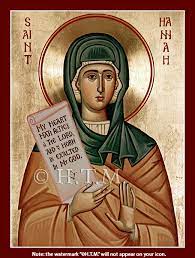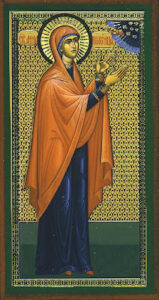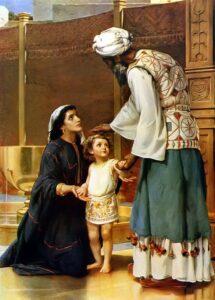Hannah, mother of the Prophet Samuel – Dec 9

Hannah (gracious, favoured) is one of the most poignant and notable characters in the Bible, for her ardent faith and absolute trust in God. Hannah (Anna), mother of Prophet Samuel, was the second wife of Elkanah. She was barren and childless. She prayed for a son, promising to dedicate him to God. Lord granted her request and her prayers were answered, gave her Samuel, the gift child, whom she offered back to the Lord, who became Israel’s first and great religious hero, seer, priest, judge, prophet, and military leader. In the Talmud she is named as one of seven prophetesses, exemplifying successful petitions to God.

Barrenness was a source of humiliation and shame, in ancient Israel. People believed that a large family was a blessing from God. Hannah’s suffering went on for years, she grieved strongly over her misfortune. Every day she prayed for an end to her barrenness, and vowed to dedicate her child to God. She desperately desired a child but could not conceive. To make matters worse, Hannah’s husband had another wife, Peninnah, who not only bore children but mocked, scoffed and taunted Hannah mercilessly. Elkanah loved Hannah, was very kind to her (1 Sam. 1: 5, 8), but Peninnah’s unkindness on top of her natural grief was too much for Hannah to bear.

Once, as she prayed fervently in the Temple in Shiloh. Hannah was praying so intently that her lips moved silently with the words she spoke to God in her heart. She knelt under her weight of difficulties and density of despair. Priest Eli thought that she was drunk, and he began to reproach her. But the Hannah poured out her grief, and answered that she was praying, pouring out her soul to the Lord. Touched by her pain, Eli answered: “Go in peace, and may the God of Israel grant you what you have asked of him.” (1 Sam. 1: 17). After she received a blessing, she returned home and in due course Hannah conceived and Scripture says, “and the Lord remembered her.” (1 Sam. 1: 19). She gave birth to a son, whom she named Samuel (which means “asked from God” or “God hears.”).
When the child as soon as he was weaned and old enough, she kept her promise to the Lord, taking him to Eli and giving him to the Lord to serve in the temple sanctuary of Shiloh, and for religious training. There, Eli worshiped God along with Hannah. And then Hannah spoke a beautiful prayer, recorded in 1 Samuel 2:1-10.

In Hannah’s prayer, God is presented as the One who helps the weak. Hannah and Peninnah represent the weak and the strong in this world. The strong often mock the weak, but God hears. She begins her prayer with “My heart exults in the Lord; my strength is exalted in the Lord.” Hannah recognized that her strength came from God and not from herself. She was not proud in her strength but rejoiced in God’s ability to make a weakling strong. Hannah’s story gives us insight into God’s heart. God does not despise human desire.
The story of Hannah and Samuel offers many important lessons. Hannah turned to God in prayer during her time of need, constant and perseverant. she never stopped praying, praised and thanked God when He did answer her prayer. She kept her commitment to the Lord, and continued to bring her desire for a child to God in persistent prayer with the unrelenting hope. Her depth in prayer, drew the mercy of God and God blessed Hannah beyond what she had asked.
Hannah had faith that God had the power to help her. She never doubted God. . She was a devout, humble woman, and God finally answered her prayers. Paul tells us to “pray without ceasing” (1 Thes. 5: 17). Hannah teaches us to never give up, to honor our promises to God, and to praise God for his wisdom and kindness. Her beautiful song of praise and thanks (1 Sam. 2: 1-10) has become the third Biblical Ode. Despite her age, God granted her three sons and two daughters. She reposed in peace.

0 Comments